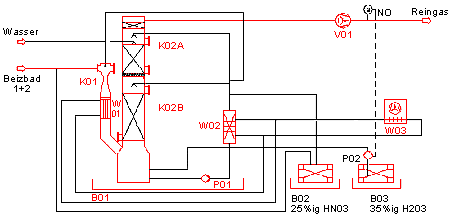NOx-separation
back
to index to
range of washers |
| Products-
Washer programme |
|
NOx
separation from waste air
Method of recovery of raw materials from waste gas without any
origin of waste |
|
| 4. Example
of the use : 4.2.1 L-NOx-Process |
| The drawn of waste
air to be purified is fed in a spray condensation washer where the waste
air is cooled by cold water to a temperature of less than 10°C and
NOx is separated preliminarily. In the next installed column with a diameter
of 1 500 mm filled with small solid bodies the two-stage washing with
30% HNO3 takes place. Between the two stages of washing a catalyst with
a space loading of 5 600 h-1 is installed. On this catalyst the NO accelerated
oxidation takes place which makes it possible to realize the washing second
stage i.e. the high-degree purification of residual gas and nitric acid
recovery. NO content in the purified gas is checked on the outlet from
the washing column. When specified limit values are exceeded hydrogen
peroxide is added to the washing circuit by means of which NO oxidation
is accelerated additionally. Velocity constants of this process are approximately
two times to three times higher than in the process described in paragraph
4.1 and it is possible to describe it in accordance with the following
representation: |
|
| (14)
|
ln
(c0/c1) = k q Q/v
bzw. |
c
- NOx concentration
k - Absorption velocity constant (m³/m²s)
q - Surface area of small solid bodies |
| (15)
|
ln(1-y)
= - k q t |
Q
- Free volume
v - Gas volume velocity
y - Degree of absorption
t - Pause time |
|
|
| At a concentration
of more than 1 vol. % NO and NO2 the absorption velocity constants
in m²/m³ s are as follows : |
|
k 10³ |
| Water absorption |
0,117 |
| 5 % NaOH |
0,38 |
| L-Nox-Process |
0,85 |
|
| The flow of the
technological process is shown in Figure 1. The hydrogen peroxide content
in this solution is lower than 2 g/l. The separation of the produced nitric
acid out of the circuit takes place on the basis of density control. At
continuous operation, therefore, an amount of 35 kg/h and 29.5 l/h respectively
of 30% nitric acid. |
|
| L-NOx process flow
sheet ( Figure 1) |

|
|
| The process described
requires the following operating cost: |
| Electric
power for cold water cooling, pumps and fans |
240 |
kW/d |
57,60 |
DM/d |
| Hydrogen
peroxide |
1,5 |
l/d |
1,00 |
DM/d |
| In
total |
|
|
58,60 |
DM/d |
|
|
| Because of the
fact that the nitric acid produced is used again in the pickling process
circuit it is not necessary to take into consideration any liquidation
cost. The attainable values of the purified gas are lower than 200-300
mg of NOx/m³. |
|
|
NOx-separation
back
to index to
range of washers |
